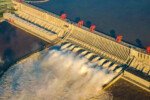HT DIGITAL
ITANAGAR, JULY 10: Arunachal Pradesh Chief Minister Pema Khandu has sounded the alarm over China’s gigantic dam project built close to the Arunachal Pradesh border, terming it a much bigger threat than any kind of military aggression.
The hydropower project is a “ticking water bomb” and can be a threat to the survival of the people, ecosystems, and livelihood in the region, the Chief Minister said in a PTI interview.
The dam, constructed on the Yarlung Tsangpo river—Brahmaputra after it enters India—is a cause of serious concern, Khandu added, as China is not a signatory to any international water-sharing agreement. It might have forced it to abide by norms like releasing minimum water flow to the downstream nations.
“The problem is, China cannot be trusted. Nobody knows what they would do,” Khandu said, pointing to the uncertainty of Chinese intentions. “Aside from the threat of military aggression, this dam project could pose an even more significant risk. It can serve as a sort of ‘water bomb,’ placing in danger the very existence of our tribes and our region.”
The Yarlung Tsangpo dam, estimated to cost around USD 137 billion, was greenlit by China in 2024 and is projected to generate 60,000 megawatts of power—making it the largest hydropower facility in the world. Its announcement followed Chinese Premier Li Keqiang’s visit to the border region in 2021.
Khandu explained that if China were a signatory to international water treaties, the dam would have been able to provide dividends. Controlled release of water could have avoided destructive seasonal floods in Arunachal Pradesh, Assam, and even Bangladesh. But since there was no legal obligation, China could release enormous volumes of water indiscriminately or retain it completely, causing havoc downstream.
“Imagine if the dam comes up and they just let go of water suddenly,” he cautioned, “our whole Siang belt would be ruined. The Adi tribe and the other indigenous people living there would lose their land, their homes, and even lives. That’s how bad the danger is.”
To the mounting concerns, Khandu stated that the Government of Arunachal Pradesh, in collaboration with the Government of India, has devised a counter-project—The Siang Upper Multipurpose Project. The project will serve as a water defence system to safeguard the river systems of India and ensure the water requirements of the future.
I think China has begun or is about to begin work on their side,” he stated, “but they do not tell us anything. Once the dam is built, it could greatly cut down the flow of the Siang and Brahmaputra rivers into India.
Khandu stressed that completion of India’s own water infrastructure project is key to long-term water security. “If China lets water out unexpectedly sometime in the future, it will result in flooding, no doubt—but with our dam, we will be able to control and manage the damage,” he asserted.
To ready communities for the future, the state government of Arunachal is opening a dialogue with indigenous tribes, particularly the Adi people, who are most vulnerable. “I am planning to convene a meeting very soon to create an awareness of the implications of this dam project,” Khandu added.
Asked what the Indian government can do to respond to China’s action, Khandu was blunt: “We cannot protest and do nothing. China never listens. Since we cannot change China’s mind, we need to work on strengthening our own defences and make sure we are ready. That is our priority.”












